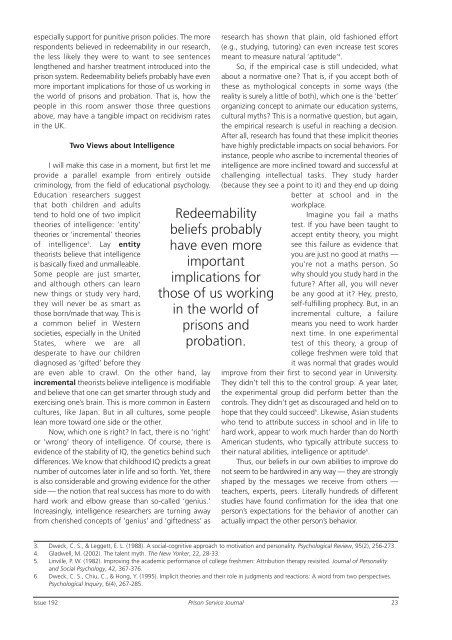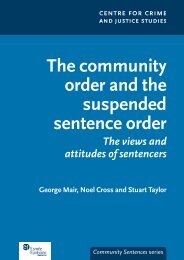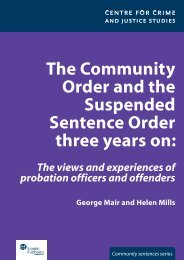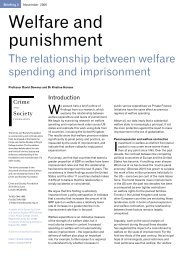PRISON SERVICE
PRISON SERVICE
PRISON SERVICE
- No tags were found...
You also want an ePaper? Increase the reach of your titles
YUMPU automatically turns print PDFs into web optimized ePapers that Google loves.
especially support for punitive prison policies. The morerespondents believed in redeemability in our research,the less likely they were to want to see sentenceslengthened and harsher treatment introduced into theprison system. Redeemability beliefs probably have evenmore important implications for those of us working inthe world of prisons and probation. That is, how thepeople in this room answer those three questionsabove, may have a tangible impact on recidivism ratesin the UK.Two Views about IntelligenceI will make this case in a moment, but first let meprovide a parallel example from entirely outsidecriminology, from the field of educational psychology.Education researchers suggestthat both children and adultstend to hold one of two implicittheories of intelligence: ‘entity’theories or ‘incremental’ theoriesof intelligence 3 . Lay entitytheorists believe that intelligenceis basically fixed and unmalleable.Some people are just smarter,and although others can learnnew things or study very hard,they will never be as smart asthose born/made that way. This isa common belief in Westernsocieties, especially in the UnitedStates, where we are alldesperate to have our childrendiagnosed as ‘gifted’ before theyare even able to crawl. On the other hand, layincremental theorists believe intelligence is modifiableand believe that one can get smarter through study andexercising one’s brain. This is more common in Easterncultures, like Japan. But in all cultures, some peoplelean more toward one side or the other.Now, which one is right? In fact, there is no ‘right’or ‘wrong’ theory of intelligence. Of course, there isevidence of the stability of IQ, the genetics behind suchdifferences. We know that childhood IQ predicts a greatnumber of outcomes later in life and so forth. Yet, thereis also considerable and growing evidence for the otherside — the notion that real success has more to do withhard work and elbow grease than so-called ‘genius.’Increasingly, intelligence researchers are turning awayfrom cherished concepts of ‘genius’ and ‘giftedness’ asRedeemabilitybeliefs probablyhave even moreimportantimplications forthose of us workingin the world ofprisons andprobation.research has shown that plain, old fashioned effort(e.g., studying, tutoring) can even increase test scoresmeant to measure natural ‘aptitude’ 4 .So, if the empirical case is still undecided, whatabout a normative one? That is, if you accept both ofthese as mythological concepts in some ways (thereality is surely a little of both), which one is the ‘better’organizing concept to animate our education systems,cultural myths? This is a normative question, but again,the empirical research is useful in reaching a decision.After all, research has found that these implicit theorieshave highly predictable impacts on social behaviors. Forinstance, people who ascribe to incremental theories ofintelligence are more inclined toward and successful atchallenging intellectual tasks. They study harder(because they see a point to it) and they end up doingbetter at school and in theworkplace.Imagine you fail a mathstest. If you have been taught toaccept entity theory, you mightsee this failure as evidence thatyou are just no good at maths —you’re not a maths person. Sowhy should you study hard in thefuture? After all, you will neverbe any good at it? Hey, presto,self-fulfilling prophecy. But, in anincremental culture, a failuremeans you need to work hardernext time. In one experimentaltest of this theory, a group ofcollege freshmen were told thatit was normal that grades wouldimprove from their first to second year in University.They didn’t tell this to the control group. A year later,the experimental group did perform better than thecontrols. They didn’t get as discouraged and held on tohope that they could succeed 5 . Likewise, Asian studentswho tend to attribute success in school and in life tohard work, appear to work much harder than do NorthAmerican students, who typically attribute success totheir natural abilities, intelligence or aptitude 6 .Thus, our beliefs in our own abilities to improve donot seem to be hardwired in any way — they are stronglyshaped by the messages we receive from others —teachers, experts, peers. Literally hundreds of differentstudies have found confirmation for the idea that oneperson’s expectations for the behavior of another canactually impact the other person’s behavior.3. Dweck, C. S., & Leggett, E. L. (1988). A social-cognitive approach to motivation and personality. Psychological Review, 95(2), 256-273.4. Gladwell, M. (2002). The talent myth. The New Yorker, 22, 28-33.5. Linville, P. W. (1982). Improving the academic performance of college freshmen: Attribution therapy revisited. Journal of Personalityand Social Psychology, 42, 367-376.6. Dweck, C. S., Chiu, C., & Hong, Y. (1995). Implicit theories and their role in judgments and reactions: A word from two perspectives.Psychological Inquiry, 6(4), 267-285.Issue 192Prison Service Journal23











